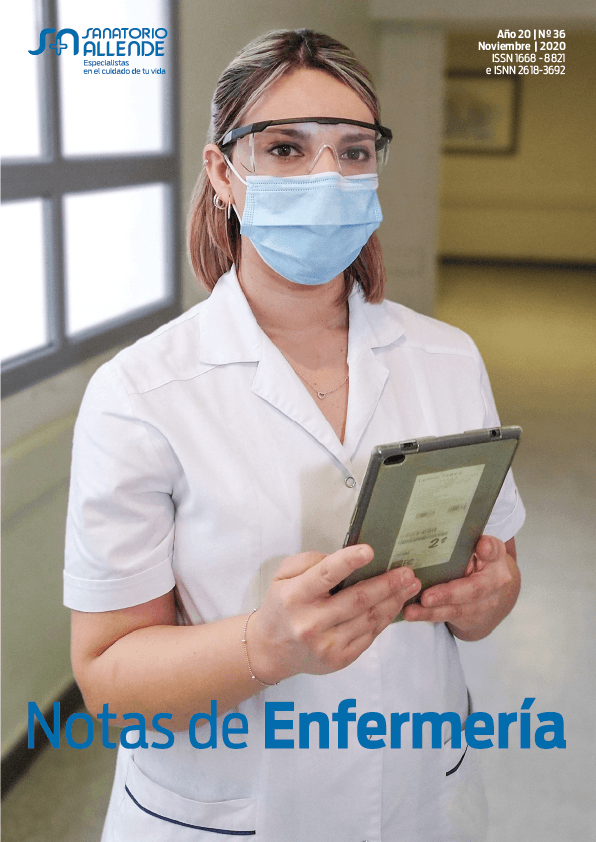Evaluation and monitoring of tele - care in pediatric patients of the oncology service
DOI:
https://doi.org/10.59843/2618-3692.v20.n36.30835Keywords:
pediatric patient, nursing, tele health, Tics, oncologyAbstract
Childhood cancer is mostly considered a chronic disease. Information about the disease and treatments is a necessity
present in all family members, in the first moments it can be difficult to understand and remember why clear information and
simple it will allow a better understanding. The new information technologies make it possible to establish infinite connections
and the field of Health, has not escaped this phenomenon, they have jumped into the health arena terms such as "Tele care"
or "Tele-Nursing" , which refers to the use of information and communications technologies. Objective: to evaluate the benefits
of implementing Tics in the continuity of care in pediatric cancer patients and their family. Material and Method: descriptive -
evaluative study, the population was of 9 patients who joined the Telecare Project. Interviews, records and checklist were used. The program has been implemented for 6 months in the institution, this evaluation corresponds to a first stage of its development. Results: these are analyzed according to the dimensions of Needs Assessment, Evaluation of conceptualization and logic of the program, Process evaluation and Evaluation of results. Conclusion: This study has allowed us to determine Tele Care as a tool that helps us improve nursing care, also increases communication processes and allows continuity of care.
Downloads
References
Polaino-Lorente A, Del Pozo A. Programas de intervención en niños cancerosos. En: Buceta JM, Bueno AM,coordinadores. Modificación de conducta y salud: perspectivas actuales en la aplicación de tratamientos de psicología.Madrid: Eudema; 1990. p. 341-61.
Bayés R. Calidad de vida y cáncer infantil. Jornadas Internacionales de Atención Multidisciplinar al Niño con Cáncer. Libro de ponencias y comunicaciones. Valencia: Federación de Asociaciones de Padres de Niños Oncológicos; 1993. p. 147-54
Ministerio de salud, Instituto nacional del Cáncer. 2017- Epidemiologia del cáncer en pediatría. Ponencia presentada en las Jornadas de Enfermeria del CONATRPE, Sociedad Argentina de Pediatria. 2017. https://www.sap.org.ar/docs/Congresos2017/CONARPE/Martes%2026-9/dra_Moreno_epidemiologia.pdf
Sawyer M, Antoniou G, Toogood I, Rice M. Childhoodcancer: a two-yearprospectivestudy of thepsychologicaladjustment of children and parents. J Am AcadChildAdolescPsychiatry 2000; 36: 1736-43.
López-Ibor, B. Aspectos médicos, psicológicos y sociales del cáncer Infantil Psicooncología,2009. 6 (2-3), 281-284.
Fernández Casale, M. El cáncer en la infancia y adolescencia: Consecuencias en el paciente, la familia y papel del asociacionismo. Tesis. Universidad de Navarra. Facultad de Psicología y Educación. España. 2015 Disponible en: https://dadun.unav.edu/bitstream/10171/39669/1/TRABAJO%20FIN%20DE%20GRADO%20PEDAGOG%C3%8DA%20MAIALEN%20FERN%C3%81NDEZ%20CASALES.pdf
Ana Navea Martín; José Antonio Tamayo Hernández. Características de la resiliencia familiar en pacientes oncológicos pediátricos: una revisión sistemática. Psicooncología ISSN: 1696-7240 http://dx.doi.org/10.5209/PSIC.61431.
Manne SL, Lesanics D, Meyers P, Wollner N, Steinherz P, Redd W. Predictors of depressivesymptomatologyamongparents of newlydiagnosedchildrenwithcancer. J PediatrPsychol 1995; 20:491-510.
Ibáñez, E., y Baquero, A. (2009). Beneficio del apoyo psicosocial a la calidad de vida de niños y niñas enfermos de cáncer: una revisión sistemática cualitativa. Rev. Colombiana enfermería, 4(4),1-21.
Xavier Méndez, Mireia Orgilés, Sofía López-Roig y José Pedro Espada. Atención Psicológica en el Cáncer Infantil. Psicooncologia. Vol. 1, Núm. 1, 2004, pp. 139-154.
Muniáin López, Ana Rosa Asociación de Ayuda a Niños con Cáncer de Navarra.
Castells M: La economía informacional y el proceso de globalización en, "La Era de la Información: Economía, Sociedad y Cultura" vol 1, La sociedad red, Alianza Editorial, Madrid 1997:
Scott L, Setter-Kliner K, Britton A. Los efectos de las intervenciones de enfermeríaMejorar la salud mental y la calidad de vida de las personas con insuficiencia cardíaca. ApplNurs Res. 2004; 17 (4): 248-256
Clark RA, Inglis SC, McAlister FA, Cleland JG, Stewart S. Telemonitorización o programas de soporte telefónico estructurado. Para pacientes con insuficiencia cardíaca crónica: sistemática.Revisión y metaanálisis. BMJ. 2007; 334 (7600): 942.
Ramachandran K, Husain N, Maikhuri R, Seth S, Vij A, Kumar M et al. Impacto de una enfermedad telefónica integral. Programa de gestión de calidad de vida en pacientes con insuficiencia cardíaca. La revista médica nacional de la India. 2007; 20 (2): 67-73
Lange I et al. Efecto de un modelo de apoyo telefónico en el auto-manejo y control metabólico de la diabetes tipo 2, en un centro de atención primaria, Santiago, Chile. RevMed Chile [online]. 2010; 138(6): 729-737.
Downloads
Published
How to Cite
Issue
Section
License
Copyright (c) 2020 Sanatorio Allende

This work is licensed under a Creative Commons Attribution-NonCommercial 4.0 International License.
Those authors who have published with this journal, accept the following terms:
- Attribution — You must give appropriate credit, provide a link to the license, and indicate if changes were made. You may do so in any reasonable manner, but not in any way that suggests the licensor endorses you or your use.
- NonCommercial — You may not use the material for commercial purposes.

